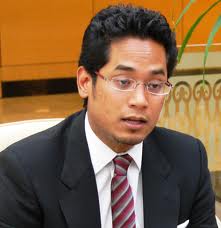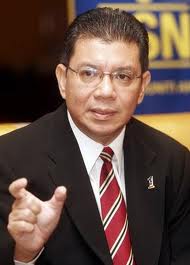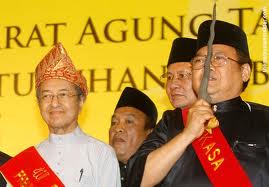- Just a day after Umno concluded its general assembly, several Pakatan Rakyat top guns gathered to give their opinion on the annual affair.
Besides Opposition Leader Datuk Seri Anwar Ibrahim, also present at last night's event themed Rapat Rakyat were DAP adviser Lim Kit Siang, PAS president Datuk Seri Hadi Awang, PAS spiritual adviser Datuk Nik Abdul Aziz Nik Mat and Selangor Mentri Besar Tan Sri Khalid Ibrahim.
The event, which was supposed to have started at 7pm, only began at about 8.30pm and ended shortly after midnight at an open space outside Stadium Melawati.
Anwar claimed that the Umno general assembly did not discuss much on issues pertaining to the welfare of the people.
Instead, he said, the party was criticising DAP and addressing issues that were irrelevant to Umno's objectives and goals.
“We don't need to announce our (Pakatan) good deeds to the people as our track record speaks for itself.”
Lim said he accepted Islam as the official religion of the country. “It is also wrong to say that DAP is against constitutional monarchy,” he added.
Lim also dismissed claims that DAP was using PAS as a tool to win the upcoming general election.
“We do not make use of each for our own interests,” he said.
Hadi, who supported Lim's statement, said it was not right for certain quarters to make such claims about Pakatan
In what was seen as the biggest threat to the 11-year rule of Vladimir Putin, Russia's prime minister, millions of Russians went to vote in the country's parliamentary elections on Sunday.
Gene Sharp, a humble, 83-year-old intellectual, has been credited with promoting non-violent struggle around the world.
Sharp's book From Dictatorship to Democracy, a how-to guide for toppling dictators first published in 1993, has been translated into 24 different languages. From Burma to Bosnia, and more recently this February in Cairo's Tahrir Square, protesters distributed Sharp's 94-page manual as a guide for overthrowing autocrats.
To many despots, Sharp's works are threatening. The president of Venezuela, Hugo Chavez, has denounced his books. In 2008, the Iranian government produced an animated video portraying Sharp as a CIA agent, hobnobbing in the White House with John McCain and George Soros.
According to a cable written by the US embassy in Damascus - and later published by WikiLeaks - Syrian dissidents trained non-violent protesters by reading Sharp's writings. Another leaked cable from 2007 revealed that Burmese authorities thought Sharp was part of an attempt to "bring down" the country's government.
He was jailed for protesting conscription in the Korean War in 1953, witnessed China's Tianamen Square uprising in 1989, and snuck into a rebel camp in Myanmar in the 1990s.
Now, a frail Sharp lives in an East Boston townhouse which is also home to his Albert Einstein Institution, a non-profit organisation that studies non-violent resistance.
One of Sharp's main ideas is that power comes from the obedience of the governed - and that if the sources of this obedience are undermined, tyrants can be toppled. In a conversation with Al Jazeera's Roxanne Horesh and Sam Bollier, a pragmatic Sharp tells us why dictators are vulnerable to well-organised, non-violent resistance.
What first made you interested in non-violent struggle?
When I was an undergraduate at Ohio State University, the world was just very much of a mess. The Second World War was fresh in our memories; the atomic bomb was new. There was European colonialism all over the world - Europeans thought they owned the rest of the world, so they divided it among themselves.
There were major problems with violence. Violence was only destroying things, it wasn’t creating things. People needed some means of struggle. I was beginning to learn that there was such a thing as non-violent struggle, but I didn’t know much about it. The literature at that time was very inadequate.
You have been working in the field of non-violent resistance for decades. How have your views evolved from your original research?
Originally I thought that in order to use non-violence, you had to believe in non-violence as an ethic or religious principle, and later I discovered that wasn’t true. And at first that was a psychological threat - my goodness, they don’t believe like they are supposed to.
But also it was a great advantage, because people didn’t have to be pacifists before they could use this kind of resistance. And I learned that this kind of resistance has been going on sometimes for centuries. Ordinary people could do this - and did this in various parts of the world.
Why do you think non-violent resistance is more effective than violent resistance?
Violence is not all that effective, if you think how long many wars last and how every war is lost by one side or the other. Wars are one of the major factors that made European colonialism possible.
There were cases [of non-violent resistance] where people like Gandhi - he was challenging the largest empire the world had ever seen, and made the British get out of India. There are a lot of examples. But we didn’t know a lot about those types of resistance.
You have said that military people understand you better than peace people do. Can you expand on what you mean?
You have said that military people understand you better than peace people do. Can you expand on what you mean?
This was a surprise at first. Sometimes I would get invited to speak to a pacifist group, and they would always give me a hard time because I was talking about pragmatic non-violent struggle, and they were talking about believing in non-violence as an ethical principle.
But when I spoke to a military audience, they understood this, because they knew strategy and tactics. The military people really took it much more seriously. That’s been true in several different countries where I met with military people. And it’s true today: My 1973 book The Politics of Nonviolent Action was reviewed very favourably in military journals in several countries. It’s not what people would expect.
You've written a lot about the importance of strategy and long-term planning for non-violent struggles to succeed. In this regard, what are your thoughts on the Occupy Wall Street movement?
You've written a lot about the importance of strategy and long-term planning for non-violent struggles to succeed. In this regard, what are your thoughts on the Occupy Wall Street movement?
They don’t have any specific demands or a clear objective. It is not like a bus boycott in Alabama, for example, many years ago - where people would just walk, or hitchhike, or take taxis instead of using the busses. They had a clear objective: to break down the segregation on the buses.
The [Occupy] protesters don’t have a clear objective, something they can actually achieve. If they think they will change the economic system by simply staying in a particular location, then they are likely to be very disappointed. Protest alone accomplishes very little.
What advice would you give to the Occupy movement?
What advice would you give to the Occupy movement?
I think they need to study how they can actually change the things they don’t like, because simply sitting or staying in a certain place will not change or improve the economic or political system.
The Arab Spring movements in some countries have become violent. Do you think this turn to violence will damage efforts to move away from dictatorial systems in those countries?
The Arab Spring movements in some countries have become violent. Do you think this turn to violence will damage efforts to move away from dictatorial systems in those countries?
Absolutely. We know that from other cases. For example, the 1905 revolution [in Russia] that was trying to get rid of the Tsarist dictatorship. People there were on the verge of complete success. The army was on the verge of mutiny. Lots of soldiers had refused to obey orders to shoot non-violent people, similar to the situation in Syria.
Non-violent means will increase your chances of the soldiers refusing to obey orders. But if you go over to violence, the soldiers will not mutiny. They will be loyal to the dictatorship and the dictatorship will have a good chance to survive, as indeed happened in the 1905 revolution. [The revolution] could have succeeded very quickly at that time, but then the Bolsheviks deliberately changed the non-violent general strike to a violent uprising. That meant the soldiers, for the first time in a long time, did obey orders. And then that gave the Tsar the ability to maintain the repression, and maintain the system for another 12 years.
|
You've said that leadership is important in non-violent struggles. But if we look at, for instance, Egypt, or Iran in 1979, there was not one clear leader early on. Can non-violent struggle be successful without a leader?
It can, and it has been at times. But in those cases, people need to understand what makes this succeed, and what makes it fail.
If they have no strong leader, this can be an advantage at times, because then the regime cannot really control the situation by arresting or killing off the leadership.
But if you are going to do it without leaders, you have to do that skillfully, and know what you’re doing. If you spread information about what is required, and have a list of “do this, and not that”, and everybody understands that, the struggle can have greater chances of success. If you don’t have that basic understanding of what you’re doing, then you’re not going to win anything.
Since the Egyptian revolution, the media has linked the Egyptian uprising to your work. What are your thoughts on this?
I think if my work had an influence, I’m happy for that. I don’t claim that and I don’t have hard evidence, and I claim very little for myself. Other people have been doing this kind of work, and doing this writing.
The people who actually do the struggles are the ones who deserve the credit, not me.
What do you think of the fact that your book From Dictatorship to Democracy is on the Muslim Brotherhood website for years?
I am honoured. Some of the bravest people waging non-violent struggle have been Muslims. One of my books had an introduction by Abdul Rahman Wahid, who headed at the time the largest Muslim organisation in the world. Back in the days of Gandhi, in the northwest frontier province of British India, Khan Abdul Ghaffar Khan, a very brave, very sophisticated and very astute Muslim leader of non-violent struggle, led a movement there. Gandhi said that the leadership of the Muslim movement in the northwest frontier exceeded that of the Hindus in India.
People are dispelling some of these ridiculous stereotypes about Muslims, and people in some other parts of the world.
Have you learned anything from people involved in non-violent struggle?
Oh, I try to learn whenever I can - because what they have done sometimes people would have thought impossible.
They have proved that it’s possible for ordinary people to maintain non-violent discipline, maintain their courage, to continue the struggle, despite the repression. As Gandhi always said, “Cast off fear. Don’t be afraid”. I thought many times myself, that’s a bit naïve. The British had the guns and the army.
But the people of Syria especially, and other countries as well, certainly in Egypt and Tunisia and on down the line - all of them - they have been very brave. And that bravery is something that deserves major credit. They’re the ones who actually do the job.
Who do you think some of the great thinkers of resistance are today?
I’m not sure. Sometimes people are really very important in leading these movements, but they sometimes don’t get the credit they often deserve. They are not as famous as Gandhi was in his lifetime. But this is not a bad thing, if people learn that they can do this and the knowledge that people power is powerful.
One struggle doesn’t always do the job; sometimes you have to have two or three or four or five struggles in succession. It’s like in a war. How many years did the Second World War last, for example? Wars are not won in the first attempt. Sometimes people lost the first battle. They learned they had to strengthen themselves, [learned] what was required to become stronger and what was required to become more brave and not to run away when they first got shot at, but they would charge ahead skillfully.
What does the Albert Einstein Institution do today?
We do research on the nature of non-violent struggle, prepare educational material, and guide translations - because if they don’t translate something accurately, it’s going to mess things up badly - and fill orders for all the continued interest from the new struggles.
What are your interests outside of your work?
I grow a variety of plants in my house, and in my backyard, and I have a small dog. I used to have big dogs, Great Danes - three or four of those - and they are great, wonderful creatures. Dogs and pets, and animals, and plants and flowers and all those kinds of things - I unwind my head that way.
 UMNO Hardliners versus Najib
UMNO Hardliners versus Najib
by Wan Saiful Wan Jan
Fellow columnist and UMNO Youth Chief Khairy Jamaluddin reportedly said that UMNO is “seen as more progressive and liberal now”. If this is truly the new image of UMNO, the party may have changed while nobody was looking.
Nevertheless, I am pleased to see Khairy urging UMNO to be “more progressive and liberal”.  Even though he has a lot of catching up to do before he can come to the level of Deputy Minister of Higher Education Datuk Saifuddin Abdullah, I do hope Khairy succeeds. UMNO needs more progressive leaders.
Even though he has a lot of catching up to do before he can come to the level of Deputy Minister of Higher Education Datuk Saifuddin Abdullah, I do hope Khairy succeeds. UMNO needs more progressive leaders.
 Even though he has a lot of catching up to do before he can come to the level of Deputy Minister of Higher Education Datuk Saifuddin Abdullah, I do hope Khairy succeeds. UMNO needs more progressive leaders.
Even though he has a lot of catching up to do before he can come to the level of Deputy Minister of Higher Education Datuk Saifuddin Abdullah, I do hope Khairy succeeds. UMNO needs more progressive leaders.In the ranks of the UMNO Supreme Council members, Saifuddin has been quite consistent in calling for change in UMNO. He has made some very good suggestions and persisted even when party members went against him. I have lost count of how many times he has become the target of UMNO’s cyber troopers.
Some of Saifuddin’s remarks, especially of late, have been remarkably forthright. In a recent interview, he said that there are three groups in UMNO. The first always believes in the need for change and does not wait for the Prime Minister to chart the course. The second also wants change but its commitment depends on what the Prime Minister says. The third does not want any major change because it is happy with the status quo.
 According to the Deputy Minister (left), the third group is “unfortunately the biggest” in UMNO today. It comprises what he calls the “hardliners”. He is right. And these “hardliners” are actually Prime Minister Datuk Seri Najib Razak’s biggest enemies in UMNO.
According to the Deputy Minister (left), the third group is “unfortunately the biggest” in UMNO today. It comprises what he calls the “hardliners”. He is right. And these “hardliners” are actually Prime Minister Datuk Seri Najib Razak’s biggest enemies in UMNO.As an aside, let me suggest that the progressives in UMNO look at the experience of PAS. The PAS progressives have more or less successfully taken over many senior positions and they are now playing a key role in shaping policies in the Islamic party. They started their work almost a decade ago, if not even earlier and the fruits of their labour are ready for the picking only now. Their journey to bring about change was long and arduous with some of them having to face repeated accusations of being disloyal to the “original struggle”. To follow in PAS’s footsteps, the progressives in UMNO must ensure that they have the required stamina and commitment for the long haul.
Coming back to UMNO, Najib has been making the right moves since the beginning of his premiership (April, 2009). The 1Malaysia slogan was, and is, a good idea.I wish the country did not need to be reminded that this land belongs to every Malaysian regardless of his race or religion. But since some people are so adept at stirring divisive sentiments, the slogan is a much-needed reminder.
The ideas in the New Economic Model, especially those in the first part that Najib launched in March 2010, were refreshing. After decades of massive state intervention in the economy with numerous unintended consequences having a Prime Minister who talks about liberalisation brings a breath of fresh air.
Similarly, after decades of living under repressive laws, many civil liberties activists were excited to hear Najib announcing major reforms on the eve of Malaysia Day (June 15) this year. They had been campaigning against laws like the Internal Security Act(ISA) and curbs on our freedom for so long that the historic speech by Najib brought on euphoric response. But UMNO hardliners seem bent on defeating these moves. Or, at least, the “hardliner mentality” is certainly putting major obstacles in his path towards transformation.
While the Prime Minister and UMNO President talked about national unity, some top UMNO leaders continued to play the race and religion cards in the run up to, and during, the recent UMNO General Assembly. The usual scare stories were repeated, accusing non-Malays, particularly those in DAP, of wanting to remove our constitutional monarchy, destroy Islam and wreck the Malay language. All were clearly designed to create a “them versus us” environment in the country.
While Najib talked about making Malaysia a competitive and liberal economy, groups of vocal UMNO members joined forces under the guise of various NGOs to derail his plans.
UMNO members joined forces under the guise of various NGOs to derail his plans.
 UMNO members joined forces under the guise of various NGOs to derail his plans.
UMNO members joined forces under the guise of various NGOs to derail his plans.Perhaps their biggest success was in forcing Najib to create institutions that were not stated in his original economic transformation agenda. Two examples come to mind–Teraju and the bumiputera unit in MRT Corp–both of which further entrench illiberal affirmative action in our economy.
And even though Najib sounded quite radical when announcing his plan for legal reform, the radicalism clearly did not trickle down to his party machinery. The country is now hearing many UMNO leaders defending unnecessary restrictions on our fundamental liberties in the Peaceful Assembly Bill passed by Dewan Rakyat last week.
It appears that there is now a big gap between Najib and UMNO. He may be articulating some progressive ideas, but UMNO as a party is refusing to follow his lead. Najib and UMNO are becoming two distinct contesting parties. The contest between Najib and UMNO is an exciting one to observe, and I certainly hope that Najib will win.
watch Russia's winds of change - Inside Story - Al Jazeera English
The vote, which was overshadowed by opposition allegations of voting irregularities, was considered a crucial test for Putin, who is seeking to return to the presidency in elections in March.
The vote, which was overshadowed by opposition allegations of voting irregularities, was considered a crucial test for Putin, who is seeking to return to the presidency in elections in March.
But despite the marginalisation of opposition groups, Putin and his United Russia party are expected to lose their two-thirds majority in parliament. Only seven parties were allowed to field candidates this year, and the loudest opposition groups had been silenced.
Will Russia's strongman maintain his influence in the Duma as he seeks to become president for a third time? Or are Russians getting tired of Putin's leadership, given the widespread corruption among officials and a growing gap between the rich and poor?
Inside Story, with presenter Stephen Cole, discusses with guests: Alexander Nekrassov, a former Kremlin adviser and author; Masha Lipman, a political analyst at the Carnegie Moscow Centre; and Ivan Safranchuk, the deputy director of the Institute of Contemporary International Studies in Moscow.
Will Russia's strongman maintain his influence in the Duma as he seeks to become president for a third time? Or are Russians getting tired of Putin's leadership, given the widespread corruption among officials and a growing gap between the rich and poor?
Inside Story, with presenter Stephen Cole, discusses with guests: Alexander Nekrassov, a former Kremlin adviser and author; Masha Lipman, a political analyst at the Carnegie Moscow Centre; and Ivan Safranchuk, the deputy director of the Institute of Contemporary International Studies in Moscow.



No comments:
Post a Comment